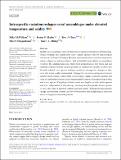Intraspecific variation reshapes coral assemblages under elevated temperature and acidity
Abstract
Insights into assemblages that can persist in extreme environments are still emerging. Ocean warming and acidification select against species with low physiological tolerance (trait-based ‘filtering’). However, intraspecific trait variation can promote species adaptation and persistence, with potentially large effects on assemblage structure. By sampling nine coral traits (four morphological, four tissue and one skeletal) along an offshore–inshore gradient in temperature and pH, we show that distantly related coral species undergo consistent intraspecific changes as they cross into warm, acidic environment. Intraspecific variation and species turnover each favoured colonies with greater tissue biomass, higher symbiont densities and reduced skeletal investments, indicating strong filtering on colony physiology within and across species. Physiological tissue traits were highly variable within species and were independent of morphology, enabling morphologically diverse species to cross into sites of elevated temperature and acidity. Widespread intraspecific change can therefore counter the loss of biodiversity and morphological structure across a steep environmental gradient.
Citation
McWilliam , M , Madin , J , Chase , T , Hoogenboom , M O & Bridge , T 2022 , ' Intraspecific variation reshapes coral assemblages under elevated temperature and acidity ' , Ecology Letters , vol. 25 , no. 11 , pp. 2513-2524 . https://doi.org/10.1111/ele.14114
Publication
Ecology Letters
Status
Peer reviewed
ISSN
1461-023XType
Journal item
Description
Funding information: National Science Foundation (USA) (Grant Number(s): 1948946), Leverhulme Trust (Grant Number(s): ECF-2021-512), Australian Research Council (Grant Number(s): DE180100746).Collections
Items in the St Andrews Research Repository are protected by copyright, with all rights reserved, unless otherwise indicated.

